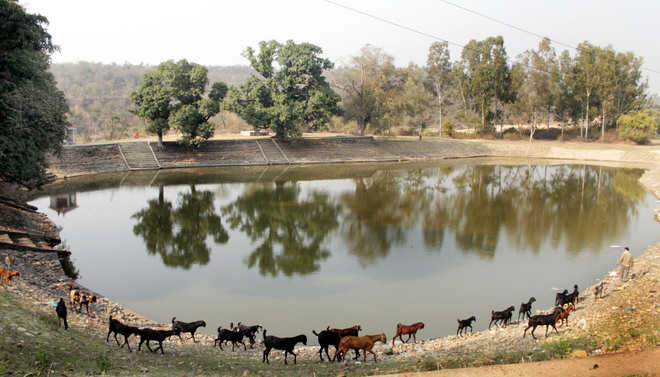Vikram Sharma
Tribune News Service
Samba, March 7
The fast extinction of water bodies in the Jammu region has left many ponds and ditches dry, the reason being attributed to rapid encroachment and urbanisation.
Amidst such environmental degradation, Rahya and Suchani villages in Samba district, 35 km from Jammu, hold the distinction of saving and preserving water bodies.
Only one of the nine ponds has gone dry, apparently due to its configuration smaller make, while the other eight brim with life, presenting the two villages as the model examples.
Khoo Talab, a significantly renowned water body at Suchani village, 2.5 km short of the prestigious central university at Bagla, is an exemplary model which is surrounded by scenic locales with mountainous terrain on one side and expanding plains on the other.
“The water in the pond is rain fed. It is the oldest one in the village and has religious and medicinal significance. The rain water seeping into this pond comes from trees and ferns on its upper banks and has been of great medicinal value,” said Khajoor Singh, sarpanch of Suchani.
There is a myth about this pond having cured a prince of Sialkot, who used to ferry horse-loads of water from Khoo Talab for drinking purposes.
“No one was ever allowed to wash clothes or bathe in these ponds as the water was used for drinking purposes. Now we have tube wells, but elders of the villages still revere these ponds with traditional sanctity as many community congregations are held on these banks,” said Om Singh, a local shepherd.
Besides, these ponds constitute an important water buffer, particularly during summer months. On the conservation of the ponds, government aid is almost negligible, confined to cementing banks. “All do not get government attention. It is the villagers who check the encroachment and pollution of the ponds,” said Mohammad Ramzan, a government teacher.
“To maintain water bodies to their scenic beauty, we have approached the administration many times for digging channels around lakes from high altitude so that enough rain water can be stored, but to no avail,” he said.
Unlock Exclusive Insights with The Tribune Premium
Take your experience further with Premium access.
Thought-provoking Opinions, Expert Analysis, In-depth Insights and other Member Only Benefits
Already a Member? Sign In Now










